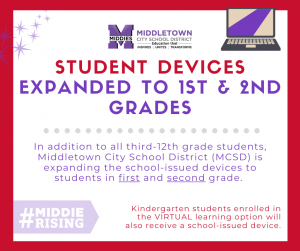ICYMI: Closing the Homework Gap in Middletown City School District

ICYMI: Closing the Homework Gap in Middletown City School District

In this article, Future Ready Schools asks Middletown City School District how the district is working to close the homework gap and digital divide. Middletown Schools is starting the 2020 school year in a remote setting. To make the remote learning experience a success for all students, Middletown Schools will issue all students grades 1-12 school-issued devices. This is a district united for providing opportunities for ALL students. The district is excited to offer students the opportunity to continue their learning outside of the school day. The district is excited to start the process of removing the device barrier and getting ALL students "logged in." Middletown City Schools has a systemic equity problem and it is excited to be a part of the positive solution.
Future Ready Schools, a national organization, helps educators around the country create student-centered learning environments with the belief that “technology is a necessary tool that enables these new systems to perform efficiently with equity for every child.”
Read all about it below!
Closing the Homework Gap in Middletown City School District
August 2020
By Kristen Loschert, Editorial Director at Alliance for Excellent Education
On any given day, about 30 percent of students in Middletown City (Ohio) School District lack the home internet connectivity they need to participate in learning activities outside of school. It’s a reality that Superintendent Marlon Styles, Jr., and his team have worked diligently to address since he arrived in the urban school district three years ago.
But when schools closed in March as a precaution against the COVID-19 pandemic, Styles realized his team had to accelerate its efforts. The district’s first step was to leverage the culture of innovation and commitment to equity it had cultivated through its participation in the Future Ready Schools® (FRS) network.
“The homework gap is definitely present here in Middletown City Schools,” explains Styles. “We need to be relentless in ensuring that the future ready experiences we create inside the classroom are accessible to all students when they leave our school buildings.”
As a short-term solution, the district adjusted its school-based technology infrastructure to allow students to access the district’s Wi-Fi network from school parking lots. But Styles knew that still would leave many students “logged out” from learning at their homes considering that all of Middletown City’s 6,485 students receive free or reduced-price meals through the school system.
So Styles reached out to several regional internet service providers to explore ways to leverage the city’s existing fiber optic network to bring reliable home internet service to students who need it. The school district now is working with a collection of community partners, including the Southwest Ohio Computer Association, Middletown Community Foundation, Chamber of Commerce, City of Middletown, and local parents, to develop a plan and raise funds to provide free home internet access to students in need. The district has agreed to provide home internet service to students in need for the next two school years at an estimated total cost of $1.2 million. Starting this fall, all students in [first] through twelfth grade also will receive a district-issued laptop computer they can take home each day from school.
“As a future ready district we have to do our part to make sure our kids are connected the best we can,” Styles explains. “If we can knock that [connectivity] barrier down and send our devices home every day, then—remote learning or not—we will be able to continue to integrate technology and extend learning beyond the school day and into homes.”
Providing students with home internet access and devices has been the greatest equity challenge facing the district, but it is only one part of the district’s strategic plan to support innovative instruction. During Styles’ tenure as superintendent, the district has focused on supporting teachers and school administrators with personalized professional learning to help them implement personalized learning pathways for students supported by technology. Every school principal and assistant principal completes a five-day digital learning “boot camp” to accelerate their understanding of best practices for technology-enhanced learning and to develop the leadership skills necessary to integrate technology in their schools. Meanwhile, teachers can pursue a collection of self-paced courses based on the skills they want to develop and earn badges that document their professional learning. Each school also has an instructional coach on staff to provide ongoing support.
“Our culture has allowed us to be successful even before remote learning happened [during the pandemic],” Styles says. “Our staff is empowered, encouraged, and supported to grow and learn and provided with opportunities to further their skill sets in the areas they choose.”
Additionally, the district’s involvement with FRS provides Middletown City with access to a diverse network of like-minded educators to share innovative ideas and exchange practical resources to support the district’s implementation of the Future Ready Framework, he adds.
“As a future ready leader, you look at all parts of the Future Ready Framework,” Styles says. “They don’t operate in isolation. They are pieces that work in unison and the [district] culture is influenced by the different components of the framework. … The Future Ready Frameworks really serve students of all backgrounds … [and] the [FRS] network is second to none. … Having access to other districts and educators who are diverse and bold in their thinking is absolutely where you want to be.”


